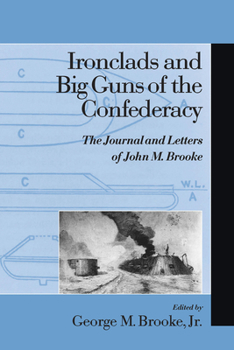Ironclads and Big Guns of the Confederacy: The Journal and Letters of John M. Brooke
(Part of the Studies in Maritime History Series and Studies in Maritime History Series)
An inside look at the Confederacy's military science and technology
Loaded with previously unavailable information about the Confederate Navy's effort to supply its fledgling forces, the wartime diaries and letters of John M. Brooke (1826-1906) tell the neglected story of the Confederate naval ordnance office, its innovations, and its strategic vision. As Confederate commander of ordnance and hydrography in Richmond, Virginia, during the Civil War, Brooke numbered among the military officers who resigned their U.S. commissions and "went South" to join the Confederate forces at the onset of conflict. A twenty-year veteran of the United States Navy who had been appointed a midshipman at the age of fourteen, Brooke was a largely self-taught military scientist whose inventions included the Brooke Deep-Sea Sounding Lead. In addition to his achievements as an inventor, Brooke was a draftsman, diarist, and inveterate letter-writer. His copious correspondence about military and personal matters from the war yields detailed and often unexpected insights into the Confederacy's naval operations.
Charged with developing a vessel that could break the Union blockade, Brooke raised the Merrimack, a wooden vessel scuttled by the Union Navy, and outfitted it with armor plates as the CSS Virginia. Brooke's papers trace his conception of the plan to create the first Confederate ironclad warship and offer insight into other innovations, revealing a massive amount of factual information about the Confederacy's production of munitions.
Related Subjects
History




